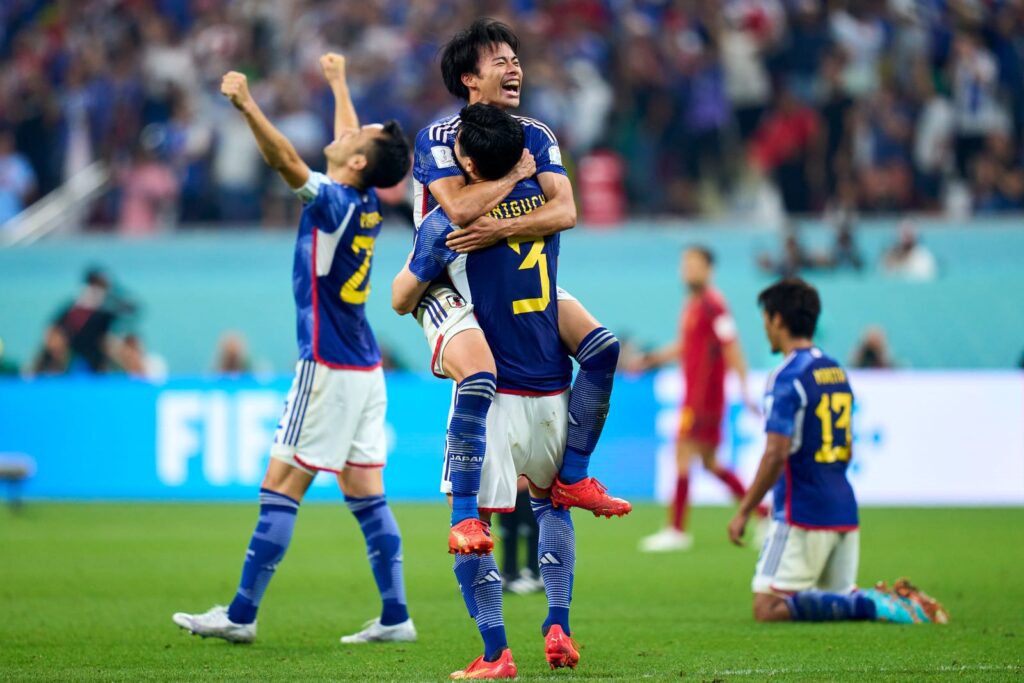Old Guard Snuff Out Asian Challenge
Asia’s World Cup hopes are over, after two contrasting defeats. Japan, not for the first time, lost their nerve at the most crucial time, while South Korea simply couldn’t overcome the gulf in class.
After the optimism and euphoria created by performances in the last round of group matches, it took a little under six hours for the Asian challenge at the 2022 World Cup to fizzle out. Japan and South Korea, who have been Asian football’s standard-bearers for a generation, went out in contrasting fashion. The Japanese suffered the heartache of another penalty shoot-out exit, while South Korea had nowhere to hide against a rampant Brazil.
There is much to learn from the progress that both teams have made, and also from the manner of their exits. Japan more than matched Croatia for vast stretches of the game, but seemed to run out of belief when they needed it most. Croatia’s midfield veterans controlled the game for much of the second half, especially after Ivan Perisic’s brilliant headed equaliser, but Japan’s pace on the break remained a constant threat.
What Japan and Hajime Moriyasu, their coach, perhaps didn’t do was ruthlessly exploit obvious Croatian weaknesses. Borna Barisic, the left-back, has had a pretty awful start to the season with a Glasgow Rangers team that went out of the Champions League without even a point from six games. Drafted into the XI in place of Borna Sosa, Barisic ran out of gas midway through the second half.
But despite Junya Ito on the right side of the Japanese midfield being full of running and a real threat with his crosses, Japan didn’t target Barisic enough. Most of the attacks came from the outstanding Kaoru Mitoma, the second-half substitute who plays for Brighton in England, on the left of midfield. Mitoma had a couple of storming runs, and stung the keeper’s palms with a long-range shot, but it was hard to escape the feeling that Japan could have used Ito more.
The long balls up the middle were pretty pointless. As gamely as Takuma Asano chased them, he was never going to get the better of Josko Gvardiol. The Croatian centre-back only turns 21 in January, but his performances here have ensured that RB Leipzig will bank well in excess of $80 million if they do decide to sell him next summer. Physically imposing, positionally adept and strong in the tackle, the masked Gvardiol has been the tournament’s most commanding defender, eclipsing even the Netherlands’ Virgil van Dijk.
Where Japan really lost it though was in the shootout. Having failed to take advantage of their younger legs in extra time, they found the challenge from 12 yards too much to handle. As a collective, Japan were a match for three of Europe’s finest teams. Penalty kicks, however, put the spotlight squarely on the individual. And the Japanese simply didn’t have the experience or nous to handle it.
The difference in body language was stark. Marcelo Brozovic has won a Serie A title with Inter Milan, and reached a World Cup final with Croatia. He swaggered to the spot, and dispatched his penalty with utmost coolness. In contrast, the three kicks Japan missed were tame affairs, struck with no belief at all. Even Takumi Minimino, who won trophies with Liverpool before moving to Monaco last summer, seemed to shrink as he neared the spot.
Yuto Nagatamo, the veteran Japanese left-back who spent seven years at Inter Milan, had given a stirring pre-match speech where he asked his teammates to fight like the Samurai. But when it came to the crunch, it was Croatia’s stalwarts, with years of top-level experience in their boots, that battled like the Japanese warriors of old. Japan were close, very close, but that final gap – the mental one – is perhaps the hardest to bridge in sports.
Korea have no need for such soul-searching. In their case, it was simply a lack of quality that ended the journey. As many as 14 of the Korean squad of 26 play at home in K League 1. Only six ply their trade in the top European leagues. And of those, only Kim Min-jae, at Serie A leaders Napoli, and Son Heung-min, at Tottenham Hotspur, play for leading clubs.
Once Brazil hit them hard and early, South Korea lost the discipline and poise that had taken them past Portugal in the group stage. The defensive line was non-existent, with Brazil cutting through almost at will. Had they not taken their foot off the pedal in the second half, the scoreline could have been really ugly.
The irony is that South Korea managed six shots on target to Brazil’s nine, with Alisson Becker making some stunning saves. But Son had a poor game, and Hwang Hee-chan couldn’t find a finishing touch to match his endeavour. In three World Cups going back to 2014, South Korea have managed just 11 goals in 10 matches. The last two Asian Cups (2015 and 2019) have seen them score 14 from 11. You simply don’t win trophies like that, not unless you can control the ball and games like Spain’s 2010 vintage.
After the group stage, there was so much excitement about the rest of the world catching up, with six of the last 16 coming from Asia (3), Africa (2) and North America (1). But the old order has now ruthlessly reasserted itself. And as painful as these defeats were, especially for Japan, we can only hope that the lessons learned from them will benefit Asian football in the years ahead.




